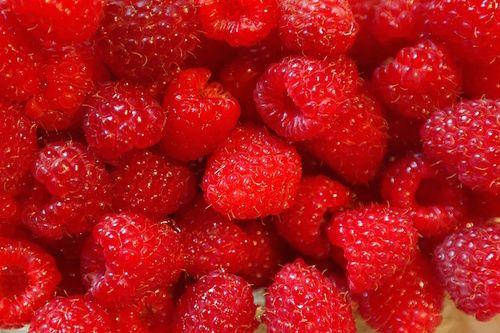Raspberries, greedy fruit and perfect for fruit salads, jams and desserts, they are also widely used in phytotherapy. In fact, they help regularize the menstrual cycle and to resolve menopausal disorders. Let's find out better.
> 1. Description of the plant
> 2. Properties and benefits of raspberries
> 3. Calories and nutritional values of raspberries
> 4. Allies of
> 5. Curiosities about raspberries
> 6. A recipe with raspberries

Description of the plant
I raspberries (Rubus idaeus), are the fruits of the plant of the Rosaceae family. They arise spontaneously in the woods, but they can also be cultivated. It seems that the first cultivations of raspberries date back to the sixteenth century.
They prefer a mild climate and can be obtained in hilly areas and in the mountains up to 2000 meters above sea level. In addition to being a tasty fruit, raspberries are widely used in Phytotherapy.
Properties and benefits of raspberries
I raspberries they contain a fair amount of minerals, including magnesium, potassium, phosphorus and sodium. They also have a good share of vitamins, in particular vitamin A, B vitamins, vitamin C, vitamin E, Vitamin K and vitamin J.
They are mostly composed of water, about 80%, and are therefore fruits diuretics, refreshing and purifying. Being low in sugar and calories, they are also suitable for those with blood sugar problems or those who follow low calorie diets. Raspberries contain ellagic acid, they are therefore fruits antioxidants.
Calories and nutritional values of raspberries
100 g of raspberries contain 34 kcal / 141 kj.
Furthermore, for 100 g of raw product we have:
- Water 84,60g
- Carbohydrates 6,50g
- Soluble sugars 6,50g
- Protein 1g
- Fats 0,60g
- Total fiber 7,40g
- Sodium 3mg
- Potassium 220mg
- Iron 1mg
- Calcium 49mg
- Phosphorus 52mg
- Vitamin B1 0,05mg
- Vitamin B2 0,02mg
- Vitamin B3 0,50mg
- Vitamin A 13µg
- Vitamin C 25mg
Raspberries, allies of
Respiratory tract, intestines, blood vessels, skin, mood.
Also discover Rubus idaeus, the raspberry bud extract against premenstrual syndrome
Curiosities about raspberries
- With the raspberry leaves infusions can be prepared against intestinal and respiratory tract inflammations.
- Raspberries should only be harvested when they are maturi, because once detached from the plant they no longer ripen. They are, however, easily perishable; it is therefore advisable to keep them immediately in the fridge and consume them within two or three days at the latest.
- Raspberries are allies of women. Thanks to their properties they help, in fact, to relieve the symptoms of painful menstruation and to control the disorders that appear in the period of menopause.
A recipe up your sleeve
Raspberries are an excellent ingredient to enrich fruit salads, prepare jams, garnish and fill desserts, flavor drinks or vinegar. However, they are also excellent on skin.
To prepare a moisturizing and revitalizing face mask a handful of raspberries (about 200 grams) and a spoonful of honey are enough.
With a fork, mash the raspberries well and add a spoonful of honey to the mixture. With a foundation brush, spread the mask on the face and neck avoiding the eye contour area. Keep on for 15/20 minutes and rinse with warm water.
Read also:
> Properties, use and contraindications of the raspberry officinal plant
> Raspberry sorbet, the recipe
> 3 raspberry recipes


























